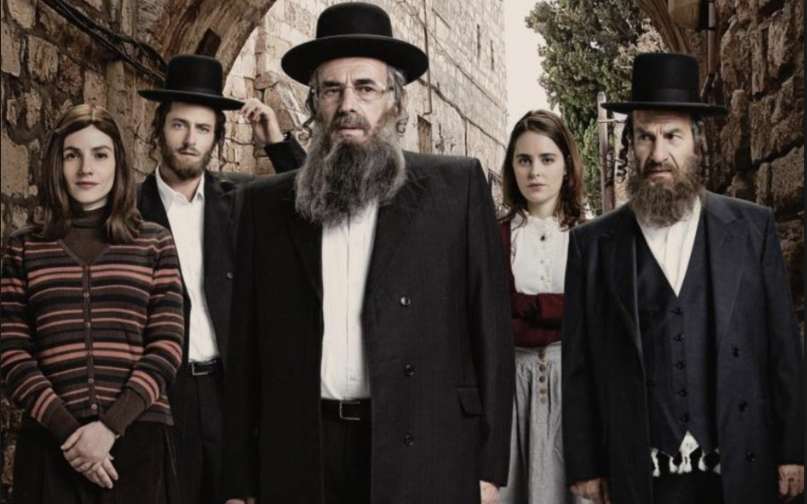(RNS) — A week ago, as Passover began, many American Jews were ready to add yet another interpretative text to their haggdot.
“The wicked child — what does he/she say? Can we put this seder on fast-forward so I can go home and binge the new season of ‘Shtisel’ on Netflix?”
It was not a heretical question. “Shtisel” is a cultural phenomenon — a multiseasoned series about a haredi family in Jerusalem, their internal struggles, their passions and their faith. (Note: This column includes spoilers.)
To resurrect the old advertising cliche: You don’t have to be Jewish to love “Shtisel.” Not since “Fiddler on the Roof” has there been such multiethnic, multireligious fascination about a story centering on pious Jews.
Why does “Shtisel” matter as much as it does?
Let me start on a personal note. It is now almost two years since I have been in Jerusalem, the place in the world that claims my soul. Jerusalem is the beating, complex urban heart of the Jewish people.
Watching the street scenes of Jerusalem in Season 3 of “Shtisel” made me wonder when I would be able to visit her again. It was an ache of hearing Hebrew (and the Yiddish that the characters would more likely be using with each other).
Jerusalem is the heart of the Jewish people, but it is a multichambered heart.
Shtisel’s Jerusalem is haredi Jerusalem — to be precise, the neighborhood of Geula, abutting Meah Shearim and just north of the city center. I have taken friends on walking tours of Geula (I billed it as the “Shtisel Tour”).
“My” Jerusalem is south Jerusalem — the German Colony, Baka, Talbiyeh, Katamon — the Jerusalem of some of Israel’s finest intellectual institutions and non-Orthodox synagogues and un-Orthodox Orthodox synagogues. My Jerusalem is admittedly a bubble, but that bubble is producing some of the most creative thinking and praying in the Jewish world.
The German Colony et al. lives in tension with Geula. But, it is the same city — and the same people. Jerusalem is a divided heart, but it is a heart, nevertheless.
But, there is a second reason why “Shtisel” matters — now, more than ever.
This past year has been a bad year for the haredim, both in Israel and in the United States. There have been far too many stories about huge haredi funerals and weddings that have not observed social distancing. There have been large demonstrations of haredim against the strictures of social distancing.
Some 1.3% of ultra-Orthodox Israelis over the age of 65 have died of COVID — four times the rate of the general Israeli population. Those fatalities have included some of the greatest rabbis of our generation.
Which got me wondering: Why do I have such affection for these characters?
In real life, we occupy very different places in the Jewish world.
I am a Reform rabbi; Shulem, Giti and Nuchem would have contempt for my Judaism. Akiva, the artist with one foot in the secular world, would probably cut me some slack.
I am a Zionist; they are anti-Zionists (Nuchem frequently referring to them as evildoers), who have contempt for a secular state.
Their Jewish world is not my Jewish world.
That is also why “Shtisel” matters. We need to see their world.
And, finally: Why does “Shtisel” matter — so much, that non-Jews flocked to watch it?
Because it succeeded in the same way that “Fiddler on the Roof” succeeded. It brilliantly succeeded in telling a common human story.
What was the story of this season?
It was about the triumph of romantic love — which means the triumph of choice.
Yosale meets the “wrong” woman on a shidduch — an arranged date, which is supposed to lead to marriage. Any tourist in a Jerusalem hotel will see sweet, shy couples in the lobby, drinking coffee or tea.
In a sweet comic mix-up, he meets the “wrong” woman named Shira — and she is the Shira he prefers to the “right” Shira.
There is even a little intra-Jewish sparring going on there. What was wrong with the beloved Shira? “They like their fish a little spicier than we do.” Translation: She is a Moroccan Jewish woman, and among the Ashkenazim, this would be an intermarriage.
Yosale winds up with the “wanted” Shira. He defies his parents. Choice wins. Modernity is already beginning to peel back the curtain.
Second relationship: Akiva, the widowed artist, and Racheli. She is an art connoisseur from a wealthy family. She wants his painting of his late wife. He cannot bear to part with it. When social services comes to investigate his home life, he asks Racheli to marry him, simply so that he can pose as a “stable” family man. It works.
But Akiva actually loves Racheli. It is more than a charade for him. Racheli is dealing with a serious mental health issue, which is a taboo in hareidi society (and hardly just in hareidi society).
Like Yosale, Akiva bucks the system. Love and choice win.
There is, of course, so much more — comic, painful and human. Each episode is a tender story that you will want to watch and re-watch. In taking the sum of its parts, Season 3 of “Shtisel” is a beautiful work of modern Jewish literature.
In the final episode, Shulem is sitting with Akiva and Nuchem. He quotes the great author Isaac Bashevis Singer (“a real rascal”):
The dead don’t go anywhere. They’re all here. Each man is a cemetery. An actual cemetery, in which lie all our grandmothers and grandfathers, the father and mother, the wife, the child. Everyone is here all the time.
With that, the dead and the living join them at the table, eating festively and laughing.
I happened to watch that episode just as Passover was coming to an end. Just in time for yizkor, the memorial service that ends the holiday.
That scene was my yizkor service.
It was all that I needed.






